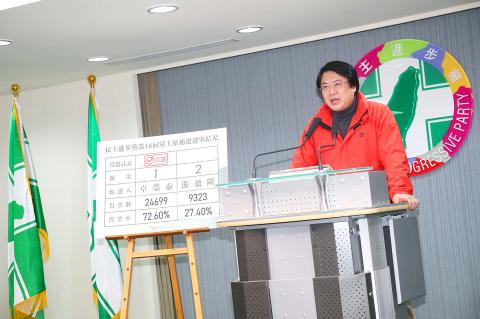Cabinet Secretary-General Cho Jung-tai (卓榮泰) was yesterday elected Democratic Progressive Party (DPP) chairman in a two-way race, DPP Acting Chairman Lin Yu-chang (林右昌) said.
Lin made the announcement at 6:40pm at a news conference at the DPP headquarters in Taipei, saying that Cho would be sworn in on Wednesday.
The by-election was held to fill the vacancy left by President Tsai Ing-wen (蔡英文) after she resigned as party chairperson on Nov. 24 to take responsibility for the DPP’s losses in the local elections.

Photo: CNA
The other candidate was Taiwanese Public Opinion Foundation chairman Michael You (游盈隆).
Voting took place from 9am to 5pm, with about 200,000 party members eligible to cast ballots at 117 polling stations nationwide.
A total of 34,230 votes were cast, representing a turnout of 16.9 percent, the party said.
Cho garnered 24,699 votes, or 72.6 percent of the total votes cast, while You received 9,323 votes, or 27.4 percent, it added.
Cho, who served in several government posts and was a lawmaker from 1999 to 2004, was backed by a group of mayors, county commissioners and legislators comprised mostly of middle-aged party members.
You, who served as the deputy head of the Mainland Affairs Council and secretary-general of the Straits Exchange Foundation during former president Chen Shui-bian’s (陳水扁) time in office from 2000 to 2008, was mainly backed by a group opposed to Tsai.
Cho is considered to be a protege of Tsai and his position on various issues are expected to be closely aligned with the president’s.
His term is to end on May 19 next year.

CHAOS: Iranians took to the streets playing celebratory music after reports of Khamenei’s death on Saturday, while mourners also gathered in Tehran yesterday Iranian Supreme Leader Ayatollah Ali Khamenei was killed in a major attack on Iran launched by Israel and the US, throwing the future of the Islamic republic into doubt and raising the risk of regional instability. Iranian state television and the state-run IRNA news agency announced the 86-year-old’s death early yesterday. US President Donald Trump said it gave Iranians their “greatest chance” to “take back” their country. The announcements came after a joint US and Israeli aerial bombardment that targeted Iranian military and governmental sites. Trump said the “heavy and pinpoint bombing” would continue through the week or as long

TRUST: The KMT said it respected the US’ timing and considerations, and hoped it would continue to honor its commitments to helping Taiwan bolster its defenses and deterrence US President Donald Trump is delaying a multibillion-dollar arms sale to Taiwan to ensure his visit to Beijing is successful, a New York Times report said. The weapons sales package has stalled in the US Department of State, the report said, citing US officials it did not identify. The White House has told agencies not to push forward ahead of Trump’s meeting with Chinese President Xi Jinping (習近平), it said. The two last month held a phone call to discuss trade and geopolitical flashpoints ahead of the summit. Xi raised the Taiwan issue and urged the US to handle arms sales to

State-run CPC Corp, Taiwan (CPC, 台灣中油) yesterday said that it had confirmed on Saturday night with its liquefied natural gas (LNG) and crude oil suppliers that shipments are proceeding as scheduled and that domestic supplies remain unaffected. The CPC yesterday announced the gasoline and diesel prices will rise by NT$0.2 and NT$0.4 per liter, respectively, starting Monday, citing Middle East tensions and blizzards in the eastern United States. CPC also iterated it has been reducing the proportion of crude oil imports from the Middle East and diversifying its supply sources in the past few years in response to geopolitical risks, expanding

Pro-democracy media tycoon Jimmy Lai’s (黎智英) fraud conviction and prison sentence were yesterday overturned by a Hong Kong court, in a surprise legal decision that comes soon after Lai was jailed for 20 years on a separate national security charge. Judges Jeremy Poon (潘兆初), Anthea Pang (彭寶琴) and Derek Pang (彭偉昌) said in the judgement that they allowed the appeal from Lai, and another defendant in the case, to proceed, as a lower court judge had “erred.” “The Court of Appeal gave them leave to appeal against their conviction, allowed their appeals, quashed the convictions and set aside the sentences,” the judges